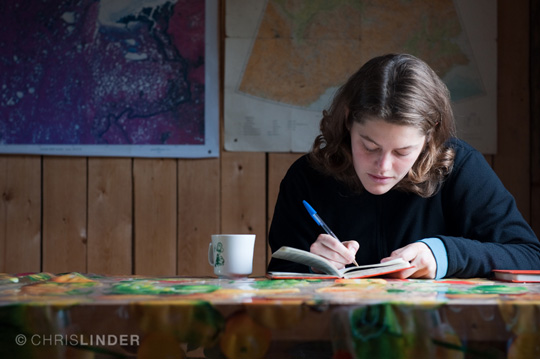Field Notes
During, before, and after the field course, Polaris students and faculty share their thoughts through journal entries.

During, before, and after the field course, Polaris students and faculty share their thoughts through journal entries.

This has been an event filled week. If you have been keeping up with the blog you might have realized a few things regarding the scientific aspects of the project: a) this part of the world has a lot of frozen carbon from the Pleistocene era stored underground called Yedoma
Continue readingAlready half way into our trip and we have sampled last summer’s locations (in yellow) and 6 new locations (in red)! The new samples include 3 flood plain streams and 3 samples up north. The stream team has been spending long hours conducting nutrient additions on the flood plain streams.…
Continue readingBelow is a series of snapshots of all Polaris students taken over the past few days. Maybe a bit rough around the edges after almost 2 weeks in Siberia, but all are well and thoroughly engaged in their projects. …
Continue readingLiving and working on a science station can be a bit like living and working in a bubble. Sure, each time you look out the window you’re reminded of the incredible beauty of Siberia but it’s easy to forget that Russia is more than just amazing views.…
Continue readingYesterday, Nikita, Blaize and I journeyed to the Omalon in support of two projects here in Siberia (See Max’s blog below). The river survey group have already introduced themselves, but Nikita and my project is a more recent development and has not yet been described here.…
Continue readingEveryone has days where one amazing thing after another occurs. But when you’re conducting research in the Siberian Arctic, amazing events take on a whole new meaning. Take, for example, my past 24 hours. It began after last night’s dinner, when Sergi Zimov hauled a giant mammoth tusk into the
Continue readingNikita Zimov and Max Holmes – sampling the Arctic Ocean off the mouth of the Kolyma River. The Polaris Project is interested in the transport and transformation of carbon and nutrients as they flow with water from uplands to the Arctic Ocean. …
Continue readingRecently we went on a field trip to Rodinka the large hill/small mountain that dominates our eastern view. Wearing our bug shirts, and covered in DEET, we rode on a bus blasting Russian techno hits. It could have been a party bus, if it hadn’t been full of mosquitoes and
Continue readingWhen you’re a kid, that question is an exciting and fun question to answer; the possibilities are endless. As we age, this inquiry seems to get more difficult to answer; until you’re a college student and the question, “What are you doing after college?”…
Continue readingIt is very nice to be back at the North East Science Station. After almost a week it is amazing how much our team of students and mentors from the US, Russia, Netherlands, and Britain have accomplished in this short of time.…
Continue readingAfter days of contemplating the meaning and the best aspect of our project we have come to name our team BOATS (Binding ocean atmosphere terrestrial systems). We are focusing on surveying the larger bodies of water to understand the carbon flux in the Kolyma watershed, which carries terrestrial carbon from
Continue readingWhen the sun does not set, keeping track of the days becomes problematic. They blend together – yesterday’s sun and sweat fading into today’s rain and thick clouds. Sweet smells are in the air, fresh and crisp after the rain. Flowers are blooming across the landscape.…
Continue readingWell, team BA has officially converted to team BARGE (Bacteria Analysis Research Group Extraordinaire)! Yesterday was an exciting day for us as we got a mini experiment started with some sample water off of the barge. Right now we’re mainly testing the BOD (Biological Oxygen Demand) probe and making sure
Continue readingThis is Elliot and Emily checking in. We are part of the “bug team” studying the diversity of benthic invertebrates (bugs that live of the bottom of lakes and streams) and their role in carbon and nutrient processing. Our project has two main parts.…
Continue readingResearch in the Arctic is tough – more often accomplished with duct tape than high tech instruments, which are typically sequestered in laboratories far removed from the Arctic. One of the challenges for foreign researchers working in Russia is that sample export is very difficult and expensive. …
Continue reading